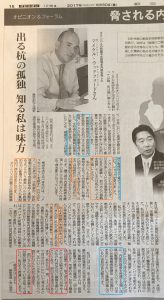This article was appeared in Asahi Newspaper a week ago, was very impressed by Mr Woodford’s sicere words toward Kihei Maekawe at the end of this article.
Michael Woodford, former president and CEO of Olympus Corp.
Since my involvement in exposing the Olympus Corp. scandal in 2011, I’ve taken a close interest in watching developments in Japan involving those who are prepared to stand up and tell the truth.
I have followed the story of Kihei Maekawa, a former administrative vice education minister, who bravely came forward to speak about the documents providing evidence of alleged illegal pressure from the Abe government.
I was shocked when Chief Cabinet Secretary Yoshihide Suga and Prime Minister Shinzo Abe openly attacked the whistle-blower, “Maekawa-san,” and then when vice education minister Hiroyuki Yoshiie spoke in the Diet, threatening to take disciplinary action against ministry officials who anonymously told the truth to reporters and handed over documents.
It is so encouraging to me that many in Japan see the situation for what it is, despite the noise from on high, and are admiring of Maekawa-san’s willingness to stand up and be counted.
What has always worried me with regard to whistle-blowers in Japan is that rather than applauding the individual’s bravery to be heard, historically the classical Japanese treatment of “knocking down the nail that sticks up” was often the default position. The treatment of Maekawa-san illustrates the continuing problem of the powerful turning on whistle-blowers.
It is critical that the focus should not be on “shooting the messenger” but, in this instance, establishing the truth of whether or not the ministry was influenced by political pressure at the highest level to quickly approve the Kake Educational Institution’s plan to open a veterinary medicine faculty.
The true hero in the Olympus scandal, the original whistle-blower who went to FACTA to expose the massive fraud and went through purgatory was an unnamed Japanese employee. I picked up on his disclosures and sought to determine what had happened at the company and who was responsible.
As a result, the other members of the board of directors voted unanimously to dismiss me as president.
Something that I found especially troubling was the way that European and American executives at Olympus subsidiaries in Britain, Germany and the United States, with a single exception, abandoned me from that moment. My efforts to reach out to them received no response whatsoever. This was true even of colleagues with whom I had been extremely close.
Meanwhile, the Japanese institutions that were Olympus’ largest creditors and shareholders were in denial and treated me as a pariah. That was extremely trying, and my wife was close to a nervous breakdown.
Maekawa-san is bound to experience loneliness and isolation, notwithstanding the public support that he has received. That is cruel and unfair, and I sympathize with him sincerely.
Retaliation against whistle-blowers also occurs in the West. Witness how Edward Snowden received withering criticism from U.S. President Barack Obama and became a subject of ostracism for revealing that U.S. intelligence agencies had listened in on the mobile phone conversations of German Prime Minister Angela Merkel and had conducted extensive surveillance of citizens.
On the other hand, Britain and the United States provide robust legal protection for whistle-blowers.
The United States has the Whistleblower Protection Act of 1989 and a full-time special counsel for investigating federal whistle-blower complaints. Britain has the Public Interest Disclosure Act of 1998, which I used to bring action against Olympus. Thus have Britain and the United States deployed strong legal protection for whistle-blowers to allow for redressing ethical breakdowns in organizations.
And I welcome the debate under way toward strengthening Japan’s Whistle-blower Protection Law, which came into effect in 2006, as a positive step.
I’m often referred to as the highest-ranking corporate whistle-blower in history, and I understand Maekawa-san is the highest-ranking bureaucrat in Japan who was prepared to “shine the light” on alleged misuse of political influence.
There are obvious similarities between us in that we both felt the obligation to speak out regardless of the consequences, but we can sleep at night knowing that we did the right thing.
I hope Maekawa-san will read my words and that he knows that I stand with him.
* * *

